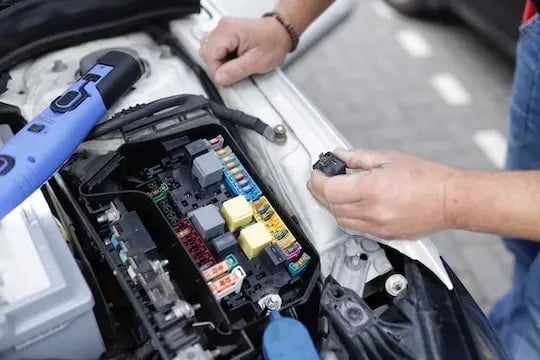What are Diagnostic Trouble Codes (DTCs)?
Diagnostic Trouble Codes (DTCs) are codes that are stored by the onboard computer diagnostic system. These codes indicate a problem in the car and are read by connecting a code reader or scanner to the vehicle's OBD-II port—a 16-pin port located under the driver's side dash. They are important to everyone with a vehicle, but especially important if you manage commercial vehicles.
History of DTC Codes
DTC codes were first used in the early 1980s and were only used by manufacturers to indicate problems with vehicles. In 1996, the Society of Automotive Engineers (SAE) created a standard for all manufacturers to use so that DTC codes could be read by any code reader or scanner.
Since 1996, all cars and light trucks sold in the United States have been required to be OBD-II equipped—a system that monitors your vehicle's performance and alerts you if there are any problems.
DTC codes and why they important
DTC codes are important because they help indicate where a problem is occurring in your vehicle. By reading the code, you can often narrow down the issue and save time and money on repairs.
The Society of Automotive Engineers (SAE) standard J2012 defines five digits for use in On-Board Diagnostics (OBD). The first digit indicates the system where the code was stored, while the second indicates the specific problem.
DTC Code numbers are made up of a combination of letters and numbers. The first letter indicates the system where the code was stored, while the second indicates the specific problem.
If your vehicle is displaying an error code, it's important to understand what that code means. These codes can help you determine the root cause of the problem. The most common codes are standardized across all vehicle manufacturers, so a P0300 on a Chevy will represent the same failure as on a GMC, Ford, or Toyota.
Click to Explore Linxup GPS >> Dash Cam + GPS | OBD GPS | Wire-in GPS | Jbus GPS | Daily Tracker ATLT | Wired Tracker AT3 | Solar Tracker
What are the DTC Codes?
Types of DTC codes
There are five main types of DTC codes that you will find in a vehicle:
- P0- Codes that refer to powertrain problems
- P1- Codes that refer to emissions problems
- C- Codes that refer to chassis problems
- U- Codes that refer to network communication problems
- B- Body control module codes
DTC codes and their meanings
The following is a list of some common DTC codes in vehicles and their meanings:
- P0- Powertrain
- P0100- Mass or Volume Air Flow Circuit Malfunction
- P0101- Mass or Volume Air Flow Circuit Range/Performance Problem
- P0102- Mass or Volume Air Flow Circuit Low Input
- C- Chassis
- C0037- Right Rear Wheel Speed Sensor Circuit
- C0037- Right Rear Wheel Speed Sensor Circuit
- U- Network Communication
- U0422- Control Module Communication Bus Off
- U0422- Control Module Communication Bus Off
- B- Body Control Module
- B1000- Push-Button Start Switch Circuit
- B1000- Push-Button Start Switch Circuit
- D- Data Link
- DTC P0420- Catalyst System Efficiency Below Threshold (Bank 1)
- DTC P0420- Catalyst System Efficiency Below Threshold (Bank 1)
How to Read DTC Codes
To read DTC codes, you will need a code reader or scanner that is compatible with your vehicle's OBD-II system. Once you have this device, simply connect it to the OBD-II port and turn on the car's ignition. The code reader or scanner will then display the DTC reading with any relevant DTC codes.
What are common DTCs?
DTCs help identify a vehicle’s current errors or malfunctions, they are not meant to determine why the malfunction occurred in the first place.
Below is a list of common DTCs and what they mean.
- P0101: An issue with the mass air flow sensor (MAF).
- P0110: A problem with the Intake Air Temperature (IAT) electrical circuit sensor sending incorrect voltage input signals to the Engine Control Unit (ECU).
- P0442: Indicates the control module detected a leak in the Evaporative Emissions System (EVAP).
- P0500: Detects inaccurate speed readings or lack of a signal from the Vehicle Speed Sensor (VSS).
- P0606: An error with the power train control module (PCM).
- P0706: Faulty transmission range sensor switch, sometimes called a neutral position switch in older vehicles.
Use a GPS tracker to monitor the DTC codes for your fleet
While a scan tool does the job, if you manage a fleet of vehicles, installing GPS trackers are a better way to actively monitor the DTC codes across all your vehicles. In addition to tracking the location and status of your vehicles, a GPS tracker can alert you as check engine lights happen so you can make decisions right away.
Additionally, a GPS tracker will allow you to see historical DTC code data so you can track trends and patterns for your entire fleet. This can be helpful in preventative maintenance and troubleshooting. Plus, you can assess the severity of an issue and better determine if rushing to a mechanic is necessary for a particular check engine light.
What to do if you get a DTC code
If you get a DTC code, the first step is to check the code against the list of common codes. If you can't find the code, then you can try an online search.
Once you have determined the meaning of the code, you can take steps to fix the problem. In some cases, this may be as simple as resetting the code. In other cases, you may need to take your vehicle to a mechanic for repairs.
Manage the Maintenance of Your Fleet with DTC Codes
DTC codes can be a useful tool in managing the maintenance of your fleet. By tracking the history of DTC codes, you can quickly identify problems with certain vehicles and take steps to fix them. You can also use the data to prevent future issues by monitoring trends and patterns.
To find out how GPS trackers can help you better understand and maintain the uptime of your fleet, contact Linxup today.
Interested to explore more of our GPS trackers or learn about Commercial Dash Cams? Schedule a demonstration anytime!



